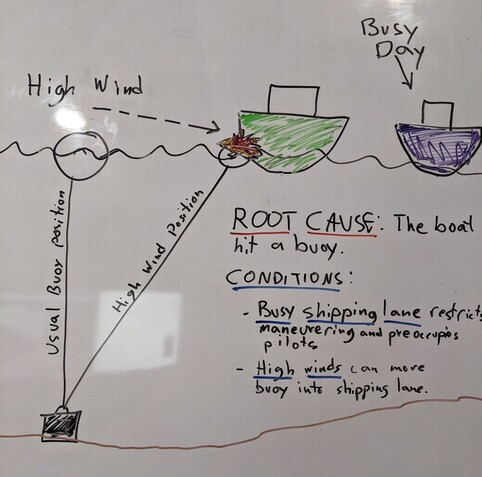Clint "SpamapS" Byrum · @SpamapS
209 followers · 257 posts · Server fosstodon.orgInspired by Dr. Ivan Pupulidy's talk at #LFIConf23 about moving gracefully from compliance to learning. If you only talk about #RootCause when reviewing incidents you will likely miss opportunities to learn. What is normal? What is exceptional? How do experts know which one is at play? #LearningFromIncidents #WhiteboardBackground
#lficonf23 #rootcause #LearningFromIncidents #whiteboardbackground
Eric Dobbs · @dobbs
44 followers · 42 posts · Server rls.socialReviewing Woods' talk at #lficonf23. A lesson in pattern-centered inquiry at 10m7s (https://youtu.be/6Fl5KhCaGBs?t=607)
We did a study of a corpus of incidents. ... What is expertise in anesthesia? It wasn't a study of error. It was a study of expertise by looking at incidents. Our key finding was about anticipating bottlenecks ahead... and being prepared ahead of a potential crisis, even if the odds were low probability. If the crisis came when you were unprepared, it was already too late.
Eric Dobbs · @dobbs
36 followers · 21 posts · Server rls.social合氣道 Aikido for a Hijacked Retro https://lfi.wiki.dbbs.co/-aikido-for-a-hijacked-retro.html
These pages cover similar ground to the material I shared about aikido and incident facilitation at #LFIConf23 (it was in the incident stories track and therefore wasn't recorded).
Tim Nicholas · @tim
207 followers · 611 posts · Server cloudisland.nzYou can never go wrong listening to @jessitron presentations and her talk at #LFIconf23 is no exception.
I particularly like the statement “Don’t take a technical task and make it into a social project”.
"Boundaries not uniformity" also strikes a cord with me. Diversity - including process diversity - helps find better ways and is less brittle.
Pirmin · @PGSchuermann
134 followers · 69 posts · Server mastodon.nzLast week I was able to participate in the first ever Learning-From-Incident conference in Denver. It was amazing.
I also ticked off a big goal: Giving a public conference talk. https://youtu.be/LrK_1ePmz54 Nerve-wracking, but I'm glad I could share what we're doing.
#lficonf23 #LearningFromIncidents #CommunityOfPractice
#lficonf23 #learningfromincidents #CommunityOfPractice
Ally Weir · @allyjweir
1 followers · 4 posts · Server hachyderm.ioAnother gem from that talk,
"Don't take a technical task and turn it into a social project".
Couldn't agree more!
ryan kitchens · @this_hits_home
509 followers · 73 posts · Server hachyderm.iohttps://m.youtube.com/playlist?list=PLQmwzq_GIU-idCnJNR4t_aKb0HDCOXfZ1
#LFIConf23 the recordings for the inaugural Learning From Incidents conference are coming online 🤩
jessitron · @jessitron
4518 followers · 307 posts · Server hachyderm.ioVideo from #LFIConf23 is live!
(that was fast)
here's 15m on why we don't use templates for incident reviews
Tim Nicholas · @tim
205 followers · 606 posts · Server cloudisland.nzOh hey. I talked at #LFIConf23 last week and the recording is now live!
I talk about how learning from incidents has shaped my role.
Reframing, advocacy, decision support…
Lorin Hochstein · @norootcause
1620 followers · 467 posts · Server hachyderm.ioryan kitchens · @this_hits_home
509 followers · 73 posts · Server hachyderm.ioa couple choice slides about indeed’s incident analysis from #LFIConf23
this is what’s involved to take you beyond a template based incident review
jessitron · @jessitron
4486 followers · 300 posts · Server hachyderm.ioFrom #LFIconf23 this week:
Simple and complicated systems yield to analysis.
Complex systems require sensemaking.
We do analysis (“exactly how does it work”) on programs and sense making (“what is going on here”) in software systems.
Both involve loops of inquiry.
J. Paul Reed · @jpaulreed
636 followers · 117 posts · Server mastodon.socialDave Mangot · @davemangot
168 followers · 130 posts · Server hachyderm.ioAre there any schools or hospitals local to downtown Denver that could use #corsirosenthalbox ? We have 10 from #LFIConf23 to give away. We need them picked up by tonight or tomorrow morning.
Lorin Hochstein · @norootcause
1601 followers · 393 posts · Server hachyderm.iojessitron · @jessitron
4486 followers · 304 posts · Server hachyderm.iodesigning culture change is self-designing
because you can’t take anything off the shelf. You have to design the change in your culture.
Dr Ivan Pupulidy #LFIConf23
Lorin Hochstein · @norootcause
1601 followers · 393 posts · Server hachyderm.ioGreat insight from
Laura Nolan: when we draw block diagrams of our systems, we invariably leave out the control links (e.g., monitoring). #LFIConf23
Philip Potter · @philandstuff
198 followers · 232 posts · Server hachyderm.ioJ. Paul Reed · @jpaulreed
633 followers · 115 posts · Server mastodon.socialOH: “Yes, your organization subversion skills are legendary.”
jessitron · @jessitron
4476 followers · 298 posts · Server hachyderm.ioadvantages of LFI (qualitative) analysis:
1. neverending stream of samples.
2. Useful results right away
3. No useless arguments over causes and categories.
4. This stuff is fascinating!
You look at this stuff, you get an understanding of reality and complex systems.



